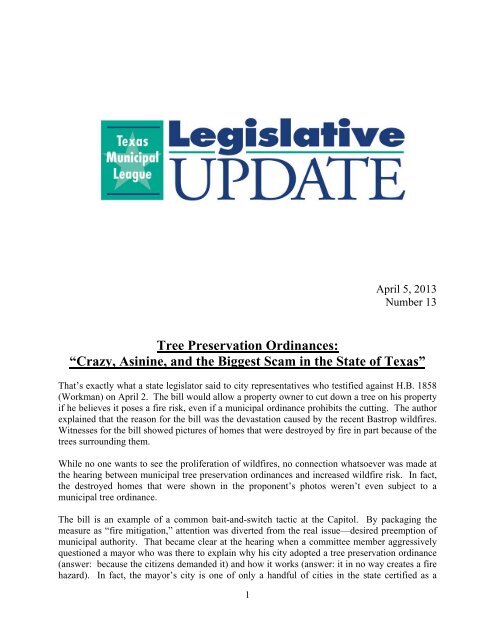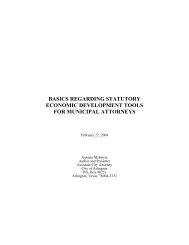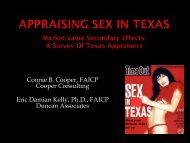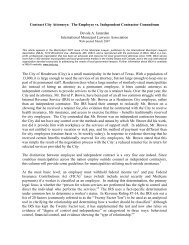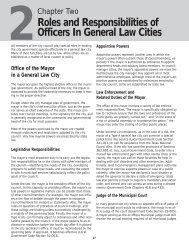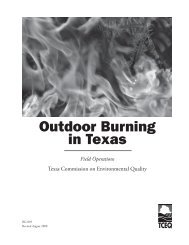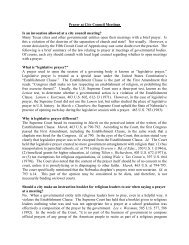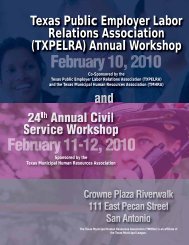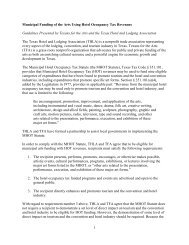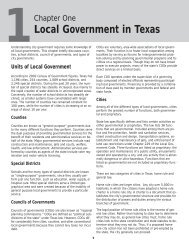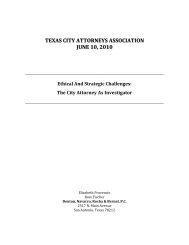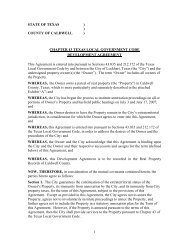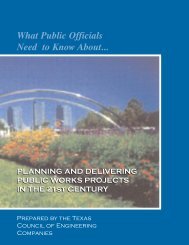Tree Preservation Ordinances - Texas Municipal League
Tree Preservation Ordinances - Texas Municipal League
Tree Preservation Ordinances - Texas Municipal League
You also want an ePaper? Increase the reach of your titles
YUMPU automatically turns print PDFs into web optimized ePapers that Google loves.
April 5, 2013Number 13<strong>Tree</strong> <strong>Preservation</strong> <strong>Ordinances</strong>:“Crazy, Asinine, and the Biggest Scam in the State of <strong>Texas</strong>”That’s exactly what a state legislator said to city representatives who testified against H.B. 1858(Workman) on April 2. The bill would allow a property owner to cut down a tree on his propertyif he believes it poses a fire risk, even if a municipal ordinance prohibits the cutting. The authorexplained that the reason for the bill was the devastation caused by the recent Bastrop wildfires.Witnesses for the bill showed pictures of homes that were destroyed by fire in part because of thetrees surrounding them.While no one wants to see the proliferation of wildfires, no connection whatsoever was made atthe hearing between municipal tree preservation ordinances and increased wildfire risk. In fact,the destroyed homes that were shown in the proponent’s photos weren’t even subject to amunicipal tree ordinance.The bill is an example of a common bait-and-switch tactic at the Capitol. By packaging themeasure as “fire mitigation,” attention was diverted from the real issue—desired preemption ofmunicipal authority. That became clear at the hearing when a committee member aggressivelyquestioned a mayor who was there to explain why his city adopted a tree preservation ordinance(answer: because the citizens demanded it) and how it works (answer: it in no way creates a firehazard). In fact, the mayor’s city is one of only a handful of cities in the state certified as a1
“Firewise Community” by the National Fire Protection Association, meaning that the city’s fireprotection regulations are among the finest.“Cities…think they’re smarter than the property owners out in the communities,” the committeemember said. Perhaps instead it was a case of a state legislator believing his judgment issuperior to that of a mayor and five city councilmembers who were elected to represent theircitizens locally.To view the mayor’s persuasive testimony, and the response from the committee member, go to:http://www.tmltv.org/BusinessIndustry.htmlReligious Freedom?Ensuring that a Sunday school classroom has smoke detectors does not infringe on anyone’spractice of religion. Requiring the beams and trusses holding up the roof above a churchsanctuary to meet engineering standards enables congregations to worship without fear thatthe ceiling will collapse on them. The same sensible standards apply to places of worshipthat protect the safety and health of Texans in other buildings they enter. A bill heard thisweek, H.J.R. 110 (Isaac) would amend the <strong>Texas</strong> Constitution in a way that would preventsuch sensible city requirements.The resolution seems deceptively simple, but would overturn decades of judicial precedentrelating to the right to practice religion. How? By removing one word: “substantially”.The current-law judicial test for determining whether a government practice relating toreligion is unconstitutional requires a “substantial burden” on a person’s ability to practicehis or her religion. Under that test, uniform and generally-applicable regulations won’tusually be found unconstitutional. For example, a municipal requirement that a place ofworship obtain a building permit and comply with uniform building codes won’t beunconstitutional, because it is not a substantial burden on a person’s ability to build a worshipfacility. By removing “substantially,” H.J.R. 110 would strike down any ordinance that“burdens” religion by even a small amount.Further, H.J.R. 110 would open the floodgates for lawsuits seeking protection for every kindof bizarre religious practice imaginable. Attempts to enforce animal cruelty laws, childprotection laws, health regulations, or public nuisance ordinances against alleged “religiouspractices” would bring needless litigation.The <strong>Texas</strong> Religious Freedom Act as it’s currently written protects religion by balancing thatimportant freedom with public safety concerns. H.J.R. 110 would destroy that balance. Toview the eloquent testimony in opposition to H.J.R. 110 by the author of the current statelaw, click here and fast forward to 1 hour and 34 minutes into the hearing:http://www.house.state.tx.us/fx/av/committee83/13040313450.ramFor a detailed review of similar measures being proposed across the country, click here to readan article by Marci Hamilton, a law professor at Cardozo School of Law.2
Fiscal Transparency Bill’s Impact on Certificates of ObligationH.B. 14 by Representative Jim Pitts (known as the “fiscal transparency” bill) would imposenumerous financial reporting requirements on local governments and dramatically restrict cities’ability to issue certificates of obligation (COs). More specifically, the bill would change thenumber of voters needed to petition to force an election on the issuance of a CO from fivepercent of the qualified voters in the city to five percent of the total number of voters who votedin the most recent gubernatorial general election in the city. To see how this would translate for<strong>Texas</strong> cities, the <strong>League</strong> surveyed a range of cities on the number of registered voters in the citycompared to the number of voters who voted in the 2010 gubernatorial election.The findings show that usually less than half of a city’s population is registered to vote, but thenumber of voters who participated in the 2010 gubernatorial election was less than half of theregistered voters. For example, a city with a population of 10,000 generally has roughly 5,000registered voters. Fewer than 2,500 of those voters, however, typically voted in the gubernatorialelection. If H.B. 14 passes in its current form, a petition of only 125 people (five percent of thosevoters) in such a city would be needed to force an election on the issuance of a CO.If only 125 people in a city of 10,000 can force an election on a CO, nearly anybody could gatherthe adequate amount of signatures needed within an hour simply by standing outside the localgrocery store. This would drastically limit the ability of a city to issue certificates of obligation.Cities turn to COs in lieu of bonds because of their flexibility for small projects or because anemergency requires immediate action.In addition, many cities use COs instead of revenue bonds to build utility infrastructure projectsbecause cities can save millions of taxpayer dollars in interest payments by issuing a CO, eventhough the debt service will ultimately be paid by utility revenues alone and not property taxes.H.B. 14 would almost certainly reduce the number of COs issued by cities, which would lead toincreased election costs and significantly higher interest payments on debt issuances that must befunded by local taxpayers.TCEQ Proposes Rainwater Harvesting RulesThe <strong>Texas</strong> Commission on Environmental Quality (TCEQ) recently released Rule ProjectNumber 2011-057-290-OW, which relates to rainwater harvesting. The text of the proposal isavailable at:http://www.tceq.texas.gov/assets/public/legal/rules/rule_lib/proposals/11057290_pro.pdfThe proposal implements changes made to the <strong>Texas</strong> Health and Safety Code in 2011 that weredesigned to encourage the use of rainwater harvesting.Though the proposed rules allow a city to refuse to connect a rainwater harvesting system to itsutility system, as the 2011 bill permits, the rules place additional burdens on cities that couldforce them to opt out of rainwater harvesting altogether.3
Representative Mike Villarreal (D – San Antonio) is the TML Legislator of the Month for March2013. Representative Villarreal represents House District 123, which includes San Antonio andCastle Hills.First elected to the <strong>Texas</strong> House in 2000, Representative Villarreal is serving in his seventh termand chairs the House Committee on Investments and Financial Services. He also serves on theHouse Committee on Public Education.Representative Villarreal is a strong supporter of cities and local control. Most recently,Representative Villarreal filed an amendment to Senate Bill 1, the stateappropriations bill, that would appropriate an additional $15 million forlocal parks grants. He is also an outspoken critic of attempts to erodemunicipal authority. In 2011, <strong>Texas</strong> Monthly named RepresentativeVillarreal as one of the ten best state legislators.outstanding leader.We hope municipal leaders across <strong>Texas</strong>, and particularly those inRepresentative Villarreal’s district, express their appreciation to thisSignificant Floor ActionsH.B. 4 (Ritter), relating to the creation and funding of the state water implementation fund for<strong>Texas</strong> to assist the <strong>Texas</strong> Water Development Board in the funding of certain water-relatedprojects. Passed the House. As passed by the House, the bill would provide that: (1) the statewater implementation fund for <strong>Texas</strong> is created as a special fund outside the state treasury;(2) the fund consists of: (a) money transferred or deposited to the credit of the fund by law;(b) the proceeds of any fee or tax imposed by this state that the legislature by statute dedicatesfor deposit to the credit of the fund; (c) any other revenue that the legislature by statute dedicatesfor deposit to the credit of the fund; (d) interest earned on the balance of the fund; and (e) moneytransferred to the fund under a bond enhancement agreement; (3) a newly-created <strong>Texas</strong>Treasury Safekeeping Trust Company shall manage and invest the fund, maintaining sufficientliquidity to meet the needs of the fund and adopting a written investment policy appropriate forthe fund; (4) at the direction of the <strong>Texas</strong> Water Development Board, the trust company shallmake disbursements from the fund to another fund or account pursuant to a bond enhancementagreement in the amounts the board determines are needed for debt service payments on orsecurity provisions of the board’s general obligation or revenue bonds; (5) of the moneydisbursed from the fund, the board shall apply not less than: (a) 10 percent to support projectsincluded in the state water plan that are designed to serve rural areas and (b) 20 percent tosupport projects included in the state water plan that are for water conservation or reuse; (6) theboard shall use money from the fund to provide financing to projects that prioritize usinghistorically underutilized businesses; (7) the board may direct the trust company to enter intobond enhancement agreements to provide a source of revenue or security for the payment of theprincipal or interest on bonds issued by the board to finance or refinance projects included in thestate water plan if the proceeds of the sale of the bonds have been or will be deposited to thecredit of: (a) the state water implementation fund; (b) the water infrastructure fund; (c) the rural5
water assistance fund; (d) the <strong>Texas</strong> Water Development Fund II state participation account; or(e) the agricultural water conservation fund; (8) the board may direct the trust company to makedisbursements for the support of bonds, including certain bonds issued before September 1,2013; (9) each regional water planning group shall prioritize projects in its respective region andthe board shall prioritize projects in the state water plan; (10) the State Water ImplementationFund for <strong>Texas</strong> Advisory Committee is created and is composed of the comptroller, threemembers of the senate appointed by the lieutenant governor, and three members of the houseappointed by the speaker of the house; (11) the advisory committee shall submitrecommendations to the board regarding the use of money in the fund for use by the board; (12)money in the state water implementation fund for <strong>Texas</strong> may be used only to provide financingor refinancing for projects included in the state water plan; and (13) financing or refinancing ofprojects may be provided by using money in the fund to make loans or purchase bonds belowprevailing market rates.S.B. 249 (Patrick), relating to the prosecution of the offense of breach of computer security.Passed the Senate.S.B. 360 (Watson), relating to methods used by an animal shelter to euthanize a dog or cat.Passed the Senate.S.B. 366 (Taylor), relating to the authority of political subdivisions to offer certain deferredcompensation plans to employees. Passed the Senate.S.B. 471 (Ellis), relating to technological efficiencies in the recording of certain open meetings.Passed the Senate.S.B. 1110 (Nichols), relating to the purposes and designation of a transportation reinvestmentzone. Passed the Senate.Significant Committee ActionsH.B. 77 (Guillen), relating to verification of financial responsibility by peace officers beforeissuing certain citations. Reported from the House Committee on Transportation.H.B. 200 (Murphy), relating to liability of certain electric utilities that allow certain uses of landthat the electric utility owns, occupies, or leases. Reported from the House Committee onJudiciary and Civil Jurisprudence.H.B. 239 (Guillen), relating to the use of a wireless communication device or other portableelectronic device to provide evidence of motor vehicle financial responsibility. Reported fromthe House Committee on Technology.H.B. 278 (Craddick), relating to the liability of a municipality for certain space flightactivities. Reported from the House Committee on Judiciary and Civil Jurisprudence.6
H.B. 483 (Aycock), relating to a public hearing held on the issue of making a payment in excessof the compensation contracted for by a political subdivision. Reported from the HouseCommittee on Government Efficiency and Reform.H.B. 489 (Menendez), relating to the use of assistance animals that provide assistance to personswith disabilities; providing criminal penalties. Reported from the House Committee on Defenseand Veterans’ Affairs.H.B. 516 (Pitts), relating to the execution of a search warrant for taking a blood specimen fromcertain persons in certain intoxication offenses. Reported from the House Committee onCriminal Jurisprudence.H.B. 528 (S. Turner), relating to the restriction of access to the records and files of a childcharged with or convicted of certain fine-only misdemeanor offenses. Reported from the HouseCommittee on Corrections.H.B. 545 (J. Davis), relating to the authority of a municipality to authorize the creation of aspaceport development corporation. Reported from the House Committee on Special PurposeDistricts.H.B. 858 (Lucio), relating to methods used by an animal shelter to euthanize a dog or cat.Reported from the House Committee on Environmental Regulation.H.B. 1019 (Patrick), relating to conforming the eligibility under a major events trust fund of aNational Collegiate Athletic Association Division I Football Bowl Subdivision postseason eventwith the changes to the Bowl Championship Series system. Reported from the HouseCommittee on Economic and Small Business Development.H.B. 1222 (C. Turner), relating to venue for certain alleged violations or offenses under theWater Safety Act. Reported from the House Committee on Culture, Recreation, and Tourism.H.B. 1485 (Lavender), relating to money allocated under the federal-aid highway program.Reported form the House Committee on Transportation.H.B. 1716 (Pickett), relating to the purposes and designation of a transportation reinvestmentzone. Reported form the House Committee on Transportation.H.B. 1744 (Elkins), relating to authorizing local governments to participate in statewidetechnology centers. Reported from the House Committee on Technology.H.B. 1960 (Cortez), relating to reciprocity for emergency medical services personnelcertification for certain United States military personnel. Reported from the House Committeeon Defense and Veterans’ Affairs.S.B. 302 (Seliger), relating to the management, operation, rulemaking authority, and oversight ofgroundwater conservation districts. Reported from the Senate Committee on Natural Resources.7
S.B. 656 (Paxton), relating to providing transparency in the taxing and budgeting process ofcertain local governments. Passed the Senate Committee on Open Government.S.B. 965 (Williams), relating to the correction of employment termination reports for lawenforcement officers. Reported from the Senate Committee on Criminal Justice.S.B. 983 (Ellis), relating to in camera review and filing of the information at issue in a suit filedunder the public information law. Reported from the Senate Committee on Open Government.S.B. 987 (Hegar), relating to requiring the attorney general to obtain an injunction against amunicipality or county that adopts prohibited regulations regarding firearms, ammunition, orfirearm supplies. Reported from the Senate Committee on Agriculture, Rural Affairs andHomeland Security.S.B. 997 (Deuell), relating to the sales and use tax consequences of economic developmentagreements in certain municipalities. Reported from the Senate Committee on EconomicDevelopment.S.B. 1114 (Whitmire), relating to the prosecution of certain misdemeanor offenses committedby children and to school district law enforcement. Reported from the Senate Committee onCriminal Justice.S.B. 1169 (Hegar), relating to water conservation. Reported from the Senate Committee onNatural Resources. [Note: this bill would require cities that receive state water aid or grants tospend a portion of that aid to mitigate water loss. Concerned cities should read the billcarefully.]S.B. 1297 (Watson), relating to written electronic communications between members of agovernmental body. Reported from the Senate Committee on Open Government. As reportedfrom the committee, the bill would: (1) provide that a communication or exchange ofinformation between members of a governmental body about public business or policy overwhich the body has supervision or control does not constitute a meeting or deliberation forpurposes of the Open Meetings Act if: (a) the communication is in writing; (b) the writing isposted to an online message board or similar Internet appication that is veiwable and searchableby the public; and (c) the communication is displayed in real time and displayed on the onlinemessage board or similar Internet application for no less than 30 days after the communication isfirst posted; (2) as to the online message board or Internet application described in (1), above:(a) prohibit the governmental body from having more than one; (b) require that it be owned orcontrolled by the governmental body, prominently displayed on the body’s primary Internet webpage, and be no more than one click away from that primary Internet web page; (c) allow it to beused only by members of the governmental body or their staff members who have receivedauthorization from a member of the governmental body; and (d) require that a staff member whoposts a communication include their name and title; (3) require a governmental body to maintaina posting on an online message board or Internet application as described in (1), above, for sixyears if a communication is removed that has been posted for at least 30 days, and provide that8
the communication is public information that must be disclosed in accordance with the PublicInformation Act; (4) prohibit a governmental body from voting or taking any action that isrequired to be taken at a meeting by posting a communication to an online message board orInternet application as described in (1), above; and (5) provide that, in no event, shall acommunication or posting on an online message board or Internet application described in (1),above, be construed to be an action of the governmental body.City Officials TestifyWhen the legislature is in session, nothing compares to the effectiveness of city officialstestifying at the Capitol. City officials who take their time to travel to Austin to speak out onimportant city issues should be applauded by us all.Among the city officials who recently testified in front of legislative committees are thefollowing:Dave Claunch, Mayor, Westlake HillsVirginia Collier, Assistant City Planner, AustinAndy Cardiel, Fire Marshall, Corpus ChristiTom Tagliabue, Intergovernmental Relations, Corpus ChristiShawn Snider, Fire Chief, EdinburgCarlos Gallinar, Planning Director, El PasoMichael Baccus, Police Department, HoustonMike Castro, City Manager, Jersey VillageLillian Lyssy, City Councilmember, Karnes CityMarcus Knight, Mayor, LancasterTerry Henley, Mayor Pro Tem, Meadows PlaceBen Griffin, City Administrator, Piney Point VillageBrian Rowland, City Council, Prairie ViewBrad Newton, Economic Development Director, PresidioSteve Spurs, City Attorney, PresidioDavid Morgan, Deputy City Manager, RichardsonMichael Gallops, Deputy Mayor Pro Tem, RowlettIvy Taylor, City Council, San AntonioDavid Blackburn, City Manager, TempleTML member cities may use the material herein for any purpose. Noother person or entity may reproduce, duplicate, or distribute any partof this document without the written authorization of the <strong>Texas</strong><strong>Municipal</strong> <strong>League</strong>.9


